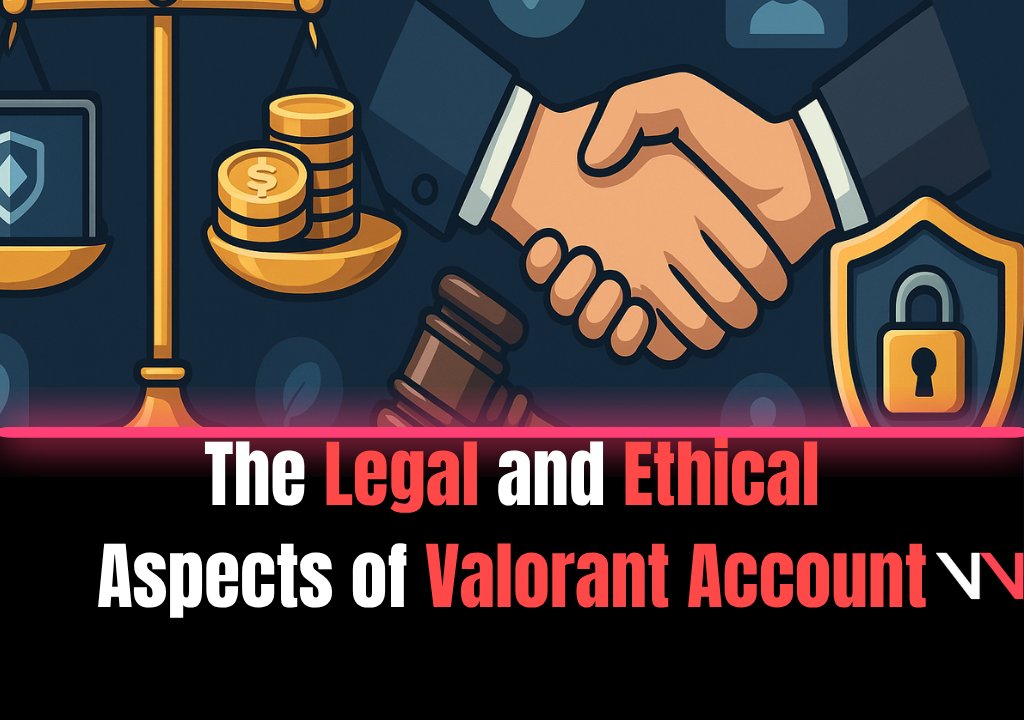The Legal and Moral Issues of Trading Valorant Accounts
Introduction
Buying and selling Valorant accounts may seem like an easy way to skip the grind or obtain rare skins and cosmetics, but it comes with significant legal and ethical risks. As account trading becomes more popular, it is essential to understand the potential consequences. In this blog, we will explore the legal implications of trading Valorant accounts, the risks involved, and the moral issues every player should consider before engaging in account purchases or sales.
1. The Legal Risks of Trading Accounts
Account trading in Valorant can lead to serious legal consequences that players may not initially think about. Riot Games, the developer of Valorant, has strict rules against account trading, which are clearly stated in their Terms of Service.
Why It’s Dangerous
According to Riot Games' Terms of Service, you cannot trade, buy, or sell Valorant accounts. If Riot Games discovers that players are trading accounts, they may ban or limit those accounts.
Legal Consequences
In extreme cases, account trading can result in legal action against both the buyer and the seller. Account trading may also violate consumer protection laws, as it typically involves transactions that Riot Games does not officially support.
2. The Moral Issues of Buying and Selling Accounts
While buying and selling Valorant accounts might seem harmless, it raises important moral concerns. The primary issue is that trading accounts for real money can disrupt the integrity of the game and create an unfair competitive environment.
Why It’s Wrong to Trade Accounts
Players who buy or sell Valorant accounts create an unfair advantage for those who haven’t earned their rank or cosmetics. This can negatively impact the experience of other players, making ranked matches less enjoyable and competitive.
What Needs to Be Done
Players should focus on earning their ranks and cosmetics through skill and effort. Promoting fair play and adhering to the game's rules creates a better, more competitive environment for all players.
3. Worries About the Safety and Security of Accounts
When buying or selling Valorant accounts, account security is a major concern. Many players turn to third-party sites, which often lack proper verification measures, putting both personal information and account security at risk.
Why It’s a Risk
Buying an account from an untrusted source can result in accounts that are hacked, stolen, or compromised. Additionally, giving personal information to a seller you don't trust can lead to fraud or identity theft.
How to Stay Safe
Ensure that any account transaction is made through official channels or trusted platforms. Since Riot Games does not support account trading, using third-party services introduces unnecessary risks.
4. Impact on the Valorant Community
Account trading doesn't just affect the individual players involved; it impacts the entire Valorant community. Trading accounts undermines the core values of the game and can cause players to lose trust in the system.
Why It’s Bad
Players who buy high-ranking accounts without earning them devalue the efforts of players who’ve worked hard to achieve their ranks. It also leads to a lack of responsibility, as players can simply buy new accounts to avoid punishments instead of facing the consequences of their actions.
How to Help
Promote a positive and fair environment by earning ranks and cosmetics through dedication. Fair play fosters a healthy community and a more competitive gaming environment.
5. Why Riot Games Doesn't Allow Trading of Accounts
Riot Games has banned account trading because it undermines the integrity of the game, encouraging cheating, fraud, and account boosting. These activities can ruin the experience for everyone.
Why Riot Bans Account Trading
Riot Games wants to maintain a level playing field for all players. Trading accounts gives players who buy high-ranked accounts an unfair advantage over players who have earned their progress.
How Riot Enforces the Ban
Riot Games uses advanced anti-cheat systems and monitoring tools to detect account trading. Players found engaging in account transactions can face bans or restrictions.
Conclusion
While trading Valorant accounts may seem like an easy way to gain rare skins or avoid the grind, it is fraught with legal and moral pitfalls. Riot Games strictly prohibits account trading, and engaging in such activities can lead to bans, a loss of game integrity, and a negative competitive environment. To ensure a fair and enjoyable experience, players should focus on earning their ranks and cosmetics through legitimate means and avoid third-party account trading.
To track the value of your Valorant account, including skins, rank, and other cosmetics, visit ValorantValue.com. The platform provides real-time insights into your account’s worth, allowing you to make informed decisions about your Valorant investments.
Tags
Jettor
Author



